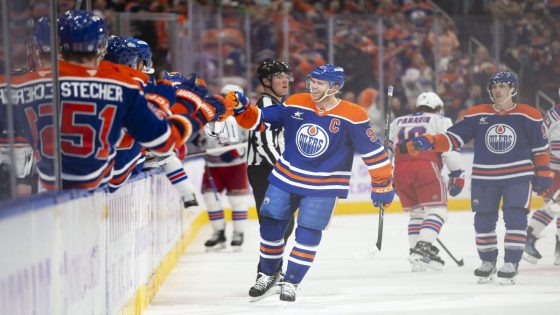LAS VEGAS — We’re T-minus seven months until Connor McDavid can sign a contract extension, a deal that could ensure his best remaining NHL years are spent with the Edmonton Oilers.
McDavid staying put into his 30s would likely make him the greatest player in the storied history of the Oilers. He has more on his mind than franchise legacy, though, when thinking about the second half of his career.
“I want to win. That’s it,” McDavid told The Athletic. “That’s all that matters to me at this point in my career.”
McDavid has one year left after this season on his eight-year, $12.5 million AAV deal. He’s eligible to sign an extension on July 1 ahead of the final year of his current contract. He’ll be 29 when his next contract starts.
From the moment running mate Leon Draisaitl signed his eight-year, $14 million AAV extension in September — a contract that kicks in next season — many leapt to the conclusion that McDavid re-upping with the Oilers was a formality.
That could still be the case, even though McDavid didn’t want to discuss what Draisaitl’s new deal could mean for him. McDavid said he left Draisaitl alone until his contract was signed.
“We didn’t talk about it at all, really,” McDavid said. “It’s his contract. It’s his business. It has nothing to do with me.”
That’s the way McDavid’s former agent, Jeff Jackson, now Oilers hockey operations CEO, sees the situation, too.
“They’re buddies — everybody ties them at the hip, and that’s the logical thing for everyone to do — but he’s his own man. He’ll make his own decision,” Jackson said. “I think if we have a team that he thinks is going to compete, he’ll be fine.”
Former Oilers GM Ken Holland often said that he didn’t have a crystal ball and couldn’t predict the future. Long-held assumptions can change quickly in pro sports. Nothing is certain until it is.
Betting that McDavid will remain an Oiler past his present deal doesn’t appear to be a big gamble.
But the Oilers, led by Jackson, aren’t getting ahead of themselves.
“We’re just leaving it because we’re not talking contract (right now),” Jackson said. “With the relationship that we have and the relationship I have with (agent) Judd (Moldaver), there’s an understanding that we’ll get to discussions when it’s appropriate.
“Right now, we’re focused on where we are in the season. It’s too early for that. I’m confident we’re going to keep Connor here for a long time, but that’s his decision in the end.”
There’s also a question of what McDavid’s contract will look like.
McDavid opted for long-term security when he signed his eight-year, $100 million contract in July 2017 — a year before his entry-level contract expired. Since then, some players have gone in a different direction.
Auston Matthews is one of McDavid’s closest comparables since the two were selected first in back-to-back drafts — 2015 for the latter and 2016 for the Toronto Maple Leafs star. They’ve shared the same agent, Moldaver, since Jackson joined the Oilers front office in August 2023.
Matthews has eschewed signing eight-year contracts, the maximum-length term allowed under the collective bargaining agreement. Instead, he signed for five years out of his entry-level contract and then agreed to a four-year deal in August 2023 that expires at the end of the 2027-28 season when he’s 30.
Other high-profile stars have opted for shorter terms in recent years. Adam Fox is on a seven-year contract. Cale Makar, Mikko Rantanen and Mitch Marner are amid six-year pacts. Kirill Kaprizov is midway through a five-year length.
Shorter contracts are more commonplace in the NBA as players have the flexibility to keep going back to the open market.
“There’s lots of different ways to go about it, and we’ll cross that bridge when we have to,” McDavid said.
And then there’s the dollars and cents of the contract — the cap hit.
The maximum of a team’s cap an individual player can assume is 20 percent. McDavid’s $12.5 million cap hit represented 15.72 percent of the Oilers’ cap when his contract began. That percentage remains the highest since the salary cap hit $69 million in 2014.
However, McDavid’s cap hit has been surpassed by Nathan MacKinnon ($12.6 million) and Matthews ($13.25 million). Next season, Draisaitl will become the highest-paid player in the NHL and bump McDavid to the No. 4 spot.
McDavid can command whatever he wants on his next deal. He’s regarded as the NHL’s best player. He has five scoring titles and three MVPs in nine full seasons. He became the fourth-fastest and fourth-youngest player to reach 1,000 points last month.
No one would argue that he doesn’t deserve to be the sport’s highest-paid player. McDavid would be worthy of a cap hit nearing $20 million with the salary cap projected to close in on the $100 million mark in two years.
But McDavid, who reportedly took less on his current deal seven years ago, wasn’t necessarily worried about that. He isn’t too concerned about driving up salaries for his peers, either.
“I feel like I set the market a long time ago,” he said. “That held for a long time. The cap was pretty stagnant there for a while. Now guys are pushing the cap (hits up).
“My priority is to win. My priority is to take care of my family. Those are the two things that I worry about. Those are my two obligations.”
(Photo: Codie McLachlan / Getty Images)





